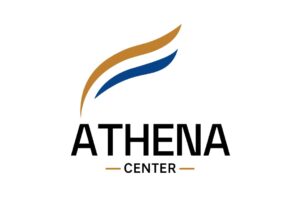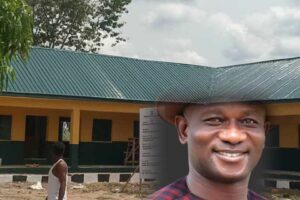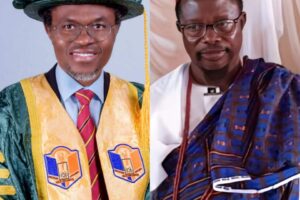As the Senator and keynote Speaker supervises the launch of a book written in recognition of Prof Pita Ejiofor

By Tony Ezike
Senator Uche Ekwunife CON was earlier today honoured with yet another special merit awards, in recognition of her notable contributions to the pursuit for academic excellence in the prestigious Nnamdi Azikiwe University Awka, Anambra State.

The Faculty of Management Sciences, Nnamdi Azikiwe University Awka in appreciation of the senator’s exceptional performance as the keynote Speaker during the 3rd Prof Pita Ejiofor Frontier Lecture presented her with an Award of Excellence today May 02, 2024.

Senator Uche Ekwunife in her keynote address described Prof Pita Ejiofor as a colossus, distinguished scholar and a leader known for his remarkable contributions to academia, business and community development.
She noted that Prof Ejiofor’s influence transcends beyond the academia through entrepreneurship and consultancy, advising organizations on strategic management and sustainable growth. Prof. Ejiofor is committed to community development and philanthropy, notably through initiatives empowering youth and promoting education.

Senator Ekwunife equally highlighted the achievements and prospects of the South-East governors, while emphasizing the pivotal roles played by renowned Igbo leaders in setting the pace for regional integration and development, citing personalities like Dr. Azikiwe, Louis Phillip Odumegwu Ojukwu, as well as other young Eastern Nigerian economists, including Pius Okigbo (PhD Northwestern), Ukwu I. Ukwu (PhD Cambridge), and Chukwu Sunday Okongwu (PhD Harvard) who conceived a strategic plan for diverse economic growth across sectors like agriculture, industry, and education.

Some of Senator Uche Ekwunife’s notable achievements in the University, which makes her deserving of the numerous awards coming her way are:
- Senator Uche Ekwunife Skill Acquisition Center, fully furnished and awaiting official commissioning.
- Two road projects connecting strategic parts of the university community.
- Solar powered street lights in four location within the school premises.
- Thousands of scholarships which have been running on a well organized scheme over the years.
The senator’s exceptional presentation during the event reads in part;

Before delving into today’s discourse, I wish to pay tribute to the soaring colossus that
we gather to celebrate. Who is Prof Pita Ejiofor? Professor Pita Ejiofor is a
distinguished scholar and a leader known for his contributions to academia, business,
and community development.
With expertise in economics, management, and regional development, Prof. Ejiofor has held leadership roles in academia, known for his innovative teaching methods and academic excellence. He extends his influence beyond academia through entrepreneurship and consultancy, advising organizations on strategic management and sustainable growth.
Prof. Ejiofor is committed to community development and philanthropy, notably through initiatives empowering youth and promoting education. His “Otu Suwakwa Igbo Initiative” aims to preserve the Igbo language and culture. As an author and speaker, Prof. Ejiofor shapes discourse and policy in business management and leadership.

His dedication to knowledge advancement and positive change solidifies his reputation as an influential figure in academic and professional realms. It is indeed an honour to be associated with you, Sir. Our keynote address is designed with two clear objectives in mind: firstly, to shed light on the crucial role of regional diplomacy in national development, with a specific focus on the Southeast region; and secondly, to showcase the Southeast’s experiences, achievements, and ongoing strategies in promoting regional collaboration for socioeconomic transformation.
By delving into these themes, we aim to provide insights that can guide policy decisions, inspire collaborative action, and pave the way for a prosperous and resilient future for the Southeast and Nigeria.
REGIONAL DIPLOMACY: Definition and Importance
Regional diplomacy refers to the strategic engagement, negotiation, and cooperation between geo-political regions within a country and the relationships that exist between states in a particular geo-political region. It encompasses the interactions, agreements, and collaborations between neighboring states or subnational entities within a defined geographical area.

At its core, regional diplomacy operates within a framework of mutual respect, trust, and understanding, guided by sovereignty, non-interference, and collective decision-making principles. It involves dialogue, negotiation, and collaboration among diverse stakeholders to achieve mutually beneficial outcomes and address common challenges.
The importance of regional collaboration within the context of national development cannot be overstated. Several factors underscore its significance:
- Economic Integration: Regional cooperation streamlines economies, markets, and supply chains within a geopolitical region, bolstering trade, investment, and economic expansion. By aligning policies and dismantling trade barriers, neighboring states boost competitiveness, attract investments, and generate job opportunities.
- Infrastructure Development: Collaborative efforts in regional planning, financing, and
execution drive infrastructure projects like transportation networks and energy grids. This cooperation enhances connectivity, lowers transportation costs, and broadens
market access, fueling economic growth and societal unity. - Resource Sharing and Management: Many geopolitical regions possess shared natural resources that transcend state borders. Cooperation ensures fair resource distribution and sustainable management, curbing conflicts and promoting environmental conservation.
- Conflict Prevention and Resolution: Regional diplomacy is pivotal in averting and resolving conflicts among neighboring states. Dialogue, trust-building, and peace initiatives foster mutual understanding, resolving disputes and maintaining stability.
- Cultural Exchange and Social Cohesion: Regional collaboration fosters cultural exchange and dialogue, promoting tolerance and social cohesion. By embracing shared
heritage and supporting cultural initiatives, neighboring states strengthen bonds and foster unity amidst diversity.
Role of Cultural Diplomacy in Regional Development
Cultural diplomacy constitutes an integral dimension of regional diplomacy, serving as a powerful tool for promoting mutual understanding, bridging cultural divides, and fostering goodwill and cooperation among neighbouring states and communities. Unlike traditional forms of diplomacy, which often focus on political or economic interests, cultural diplomacy emphasises the role of soft power, cultural exchange, and public diplomacy in shaping perceptions, building trust, and forging lasting relationships. In the context of regional diplomacy, cultural diplomacy plays several key roles:
- Promoting Cultural Exchange: Cultural diplomacy facilitates the exchange of ideas,values, and artistic expressions among neighboring states, promoting cross-cultural understanding and appreciation. Through initiatives such as cultural festivals, artistic exhibitions, and educational exchanges, regional organizations create opportunities for citizens to engage with and learn from diverse cultural traditions and perspectives.
- Building Bridges of Friendship: Cultural diplomacy fosters interpersonal connections and people-to-people interactions, breaking down stereotypes, prejudices, and misconceptions that may hinder cooperation and collaboration. By highlighting shared cultural heritage and promoting intercultural dialogue, regional organizations build bridges of friendship and solidarity among neighboring communities, laying the foundation for enduring partnerships and mutual trust.
- Enhancing Soft Power: Cultural diplomacy enhances a region’s soft power by projecting a positive image abroad, promoting its cultural heritage, and winning hearts and minds through cultural outreach and engagement. By showcasing the richness and diversity of its cultural traditions, regional organizations enhance their attractiveness and influence on the global stage, thereby strengthening their diplomatic leverage and enhancing their ability to shape international perceptions and narratives.
- Promoting Peace and Stability: Cultural diplomacy contributes to the promotion of peace and stability within the region by fostering mutual respect, tolerance, and understanding among diverse ethnic, religious, and linguistic communities. By celebrating cultural diversity and promoting intercultural dialogue, regional organizations create platforms for conflict prevention, reconciliation, and peacebuilding, thereby contributing to the resolution of underlying grievances and the consolidation of peaceful coexistence.
The Socio-Economic Landscape of Nigeria’s Southeast Region
Brief Overview of the Southeast Region
Nigeria’s Southeast region, often referred to as “Igboland,” is a vibrant and culturally rich area located in the southeastern part of the country. Comprising five states—Abia, Anambra, Ebonyi, Enugu, and Imo—the Southeast is home to a diverse population with a rich history, traditions, and customs that have shaped the region’s identity.

The Southeast is known for its entrepreneurial spirit, with a thriving private sector thatencompasses industries such as manufacturing, commerce, and services. The region’s strategic location, coupled with its skilled workforce and robust commercial networks, has positioned it as a hub for trade and investment, attracting both domestic and foreign investors seeking opportunities in Nigeria’s burgeoning economy.
Moreover, the Southeast boasts a wealth of natural resources, including arable land, minerals, and hydrocarbon deposits, which serve as the foundation for the region’s agricultural and extractive industries. From the fertile plains of Abia to the coal-rich fields of Enugu, the Southeast is endowed with abundant resources that have the potential to drive economic growth and prosperity for its inhabitants.

However, despite its considerable economic potential, the Southeast region faces a myriad of socio-economic challenges that threaten to impede its development and undermine the wellbeing of its citizens. From infrastructural deficits to youth unemployment, these challenges demand concerted action and targeted interventions to unleash the region’s full potential and pave the way for inclusive growth and sustainable development.
Socio-Economic Challenges Faced by the Region
The Southeast region grapples with a range of socio-economic challenges that hinder its
progress and impede the realization of its developmental aspirations. Some of the key
challenges include:
- Security Concerns: Like other regions in Nigeria, the Southeast has experienced security challenges, including incidents of communal clashes, kidnappings, and violent
crime. Insecurity undermines investor confidence, disrupts economic activities, and poses a threat to peace and stability within the region. - Infrastructure Deficits: The Southeast region suffers from inadequate infrastructure, including roads, bridges, power supply, and water resources, which limits economic
activities, impedes mobility, and undermines the quality of life for residents. - Unemployment and Underemployment: The Southeast has a significant youth population, many of whom are either unemployed or underemployed. Limited job opportunities, coupled with a mismatch between skills and market demands, contribute to youth restiveness, social unrest, and economic stagnation.
- Poverty and Inequality: Despite its economic potential, the Southeast grapples with high levels of poverty and income inequality, with a significant proportion of the
population living below the poverty line. Persistent socio-economic disparities exacerbate social tensions and hinder efforts to achieve inclusive growth and development. - Weak Social Infrastructure: The Southeast faces challenges in the provision of essential social services, including healthcare, education, and housing. Inadequate access to quality healthcare facilities, educational institutions, and affordable housing options limits opportunities for human capital development and social mobility.
In light of these socio-economic challenges, there is an urgent need for specialised development initiatives tailored to the unique needs and circumstances of the Southeast region. This informed the current drive to establish the Southeast Development Commission (SEDC), which represents a proactive response to these challenges and underscores the government’s commitment to addressing regional disparities and promoting inclusive development.
Previous Regional Diplomacy for Development in the Southeast: Before the War
Before the Nigeria-Biafra Civil War, the economic development of the former Eastern Region, now known as the Southeast, was meticulously orchestrated by the US consulting firm Arthur D. Little. This strategic planning involved key figures such as Dr. Azikiwe and Louis Phillip Odumegwu Ojukwu, who played pivotal roles.
Arthur D. Little collaborated with a group of young Eastern Nigerian economists, including Pius Okigbo (PhD Northwestern), Ukwu I. Ukwu (PhD Cambridge), and Chukwu Sunday Okongwu (PhD Harvard). Together, they aimed for diverse economic growth across sectors like agriculture, industry, and education.
Notable achievements of this plan included the establishment of the University of Nigeria, Nsukka (UNN), which collaborated with universities in Michigan and New York to pioneer fields like medicine, engineering, surveying, and business administration.
Additionally, industrial estates and corridors were developed to stimulate economic activity. These included Trans-Amadi in PH, Aba for light industries, Umuahia for biotechnology, Emene in Enugu for steel and industrial automation, and Nkalagu, PH, and Calabar for cement and building materials. Onitsha was designated as an emporium to drive retail trading, while Obudu in Cross River was developed for dairy, holidaying, and corporate meetings.
The region saw the establishment of plantations for cashew nuts, palm kernel, cocoa, coffee, and timber in various locations. Michael Okpara even personally delivered seedlings for these projects. While development and education started in Lagos and Abeokuta in the 1850s, giving the Southwest a significant head start, the East’s economy grew rapidly after Arthur D Little’s plan, reaching over 9.2% growth annually from 1958 to 1967.
Three industrial corridors were planned for the East. The Emene-Nkalagu corridor focused on automobiles, building materials, and industrial automation, while another stretched between PH and Aba. The aim was to create a massive industrial conurbation akin to Germany’s Ruhr Industrial Valley. Onitsha was designated to drive the East’s retail economy, emulating a model later adopted by Dubai.
The Eastern Nigeria Development Corporation (ENDC) and the Eastern Nigerian Commodities Board (ENCB), headed by Sir Louis Phillip Odumegwu Ojukwu, centrally drove these projects. Funding came from local revenues, direct foreign investments, and loans from the Commonwealth Development Corporation (CDC). Additionally, Chief Nwodo negotiated oil contracts with Shell on a 50-50 basis, but most oil assets were seized by the Federal Government without compensation, contributing to the region’s economic decline.
Present Regional Diplomacy for Development in the Southeast: Towards a 50-year Master for Southeast
The Governors of the Southeastern Nigeria are at the forefront of driving the development of the region through a well thought out strategic plan. Through a deliberate regional diplomatic framework, they have embarked on bold and deliberate plans to transform the regional infrastructural deficit such as rail system, tackle insecurity, power, human capital development, among others. The current efforts by the South East Governors Forum (SEGOF) is receiving impetus from
the coordinating office of the Director-General where I am currently at the head
of affairs.
Strategies of SEGOF to Foster Development
- Modernizing the Igba Boy Apprenticeship Scheme: We’re revitalizing the traditional Igba Boy apprenticeship system to empower youths and spur development. Starting with 1000 youths annually from each of the five states, we aim to produce 5000 millionaires per batch, driving progress in Nigeria and
beyond. - Joint Efforts to Attract Investments: Governors are cultivating economic growth by attracting investments and fostering a conducive business environment. Initiatives like megacities and industrial parks will stimulate economic activities, generating employment and sectoral growth. The Southeast region is poised for transformative development, with accelerated projects focusing on infrastructure, power, security, education, agriculture, and economic expansion.
- Collaborative Governance: Southeast governors are partnering on transformative projects such as regional rail systems and improved power supply. Milestones like rehabilitating the Eastern rail line and the Light Up Southeast project illustrate a commitment to development. Uniform legislation efforts aim to streamline the power sector’s regulatory framework, fostering economic growth and regional progress.
- Tracking the Governors in the Region for Milesonte, People-Oriented Projects: The Southeast region is intentionally executing significant milestones under the leadership of the various governors. So far, under the Southeast governors’ leadership, milestones abound.
a. Governor Alex Otti’s Geometric Electric Plant launch promises economic growth in Abia State.
b. In Imo, Governor Hope Uzodimma’s gas plant completion aids the power supply.
c. Anambra’s Governor Chukwuma Soludo’s educational reforms and hinterland road development elevate the state.
d. Ebonyi’s Governor Francis Nwifuru’s focus on infrastructure and healthcare bolsters the state’s development.
e. Lastly, Governor Peter Mbah’s initiatives in Enugu, like urban road repairs and security enhancements, signify proactive governance.
These achievements underscore a collective commitment to regional progress and
prosperity.
- Regional Diplomacy Agenda: As part of our regional diplomacy strategy to foster development, we have initiated dialogue with the Chinese Ambassador to streamline visa policies for our entrepreneurs operating in China. Additionally, we’ve actively engaged with Federal Government Ministries, particularly the Federal Ministry of Environment, to address pressing issues such as the severe erosion menace and environmental pollution in our region.
These diplomatic efforts underscore our
commitment to collaborating with international partners and relevant government agencies to promote sustainable development and mitigate challenges that hinder progress in our region.
- Establishment of Anya-Oha Security Framework: The SEGOF Secretariat has undertaken a thorough review of the recommendations stemming from the recent South East Security and Economic Summit in Owerri and similar conferences from previous years. This evaluation aims to develop an actionable plan with clear timelines for implementation, particularly focusing on the establishment of the Anya-Oha security framework.
- Expeditious Enactment of the South East Development Commission Bill: SEGOF is actively engaging with the leadership of the National Assembly to ensure the expeditious passage of the South East Development Commission (SEDC) bill. Once passed, the bill will be forwarded to the President for his approval. The establishment of the SEDC is anticipated to enhance the quality of life for residents and stimulate economic growth. By creating a favourable environment for increased economic activities, the SEDC aims to unlock the region’s potential, attract investments, generate employment, and support various economic development endeavors.
- 50-year Southeast Development Master Plan: We are in the process of formulating a comprehensive regional master plan aimed at steering the long-term development of our region. This master plan will encompass various aspects of development, including major infrastructure in rail transport and in power, economic growth, social services, environmental sustainability, and more. It will outline strategic objectives, policies, and
initiatives to be implemented over the next 50 years to foster sustainable development and improve the overall well-being of our communities.
Once finalized, the master plan will serve as a roadmap for guiding development efforts and achieving sustainable growth and prosperity in our region over the coming decades.
Conclusion
In conclusion, regional cooperation, human capital investment, inclusive governance, and peacebuilding within the Southeast region are paramount for sustainable development and prosperity. Policymakers, stakeholders, and partners must reiterate their commitment to these principles and translate them into actionable strategies. By prioritising dialogue, fostering partnerships, and investing in education and skills training, we can empower individuals and communities to actively participate in regional initiatives and unleash the region’s full potential.
Additionally, promoting inclusive governance structures and supporting peacebuilding efforts will build trust and strengthen social cohesion, laying the foundation for sustainable progress. As we move forward, let us remain steadfast in our dedication to strengthening regional diplomacy, fostering collaboration, and building a more prosperous and inclusive future for all in the Southeast region.
Presenting the Award of Excellence to Distinguished Senator Uche Ekwunife Ph.D, the Vice Chancellor of Nnamdi Azikiwe University, Prof Charles Esimone described Senator Ekwunife as one-of-a-kind, whose commitment towards academic excellence is second to none.

Professor Esimone noted that Senator Ekwunife’s passion for human capital development and massive investments in education is unprecedented and will forever be cherished by the management, staff and students of the prestigious institution of higher learning.
Senator Ekwunife was later conducted the official unveiling and launch of the book VISIONARIES OF CHANGE, Prof Pita Ejiofor’s Timeless Insights For Excellence, compiled by Prof Pius VC Okoye, Prof Ezimma Nnabuife and Prof Anayo Nkamnebe.
Ekwunife was joined at that segment by the Vice Chancellor Nnamdi Azikiwe University and 18th most published scholar in Nigeria’s educational history, Prof Charles Esimone, Nigeria’s Ambassador to Burundi, Amb Elijah Onyeagba, Chairman of the event, High Chief Simon Metuh, Chairman Organizing Committee, Prof Ezimma Nnabuife, Barr George Akpamgbo, Prof Josephat Ogbuagu, among other dignitaries.




